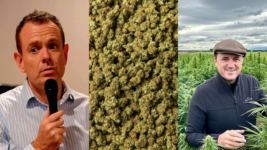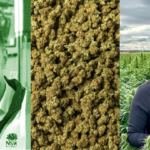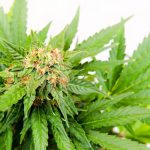NSW Inquiry into Cannabis Laws Recommends Staged Reforms Leading to Legalisation

The NSW parliamentary inquiry into state laws governing cannabis released its final report on 20 June 2025, and its central issue, that the fairly innocuous psychoactive plant remains illegal, was found to be causing harm in the community and the committee members have recommended a cautious staged approach towards realising a regulated legal cannabis market.
The seven committee members that carried out the investigation found that the current illegal classification of cannabis for recreational use is having no direct impact on reducing cannabis use, which has long involved a little over 10 percent of the country’s population partaking in the substance regularly, and the actual harms identified are those that stem from criminalisation.
Currently, the personal possession of cannabis continues to carry up to 2 years imprisonment and/or a fine of $2,200. Most committee members insist that the potential for a custodial sentence to be imposed in relation to a small amount of cannabis is “unacceptable”, so the removal of this penalty should be immediately progressed, as it is the greatest harm associated with the drug at present.
“As a first step, the government should remove the possibility of custodial sentences for possession of small quantities of cannabis. The majority of the committee consider the 2 year maximum penalty for this offence to be draconian and out of touch with community standards,” said committee chair Legalise Cannabis MLC Jeremy Buckingham, who initiated the inquiry.
The Impact of the Regulatory Framework for Cannabis in NSW inquiry has made a number of other sensible cannabis law reform recommendations that wouldn’t raise an eyebrow amongst much of the NSW constituency these days. However, one major impediment in regard to progressing these reforms is NSW premier Chris Minns, who ruled out decriminalising cannabis in August 2024.
A sensible staggered approach
“The committee has recommended a staged approach to cannabis law reform,” Buckingham set out in a 20 June 2025 press statement. “To start, the government should remove draconian custodial sentences for possession of small quantities of cannabis.”
“Then, we recommend decriminalisation of cannabis use and possession, and ultimately a move towards a safe, regulated, legalised cannabis market,” the Legalise Cannabis NSW MLC continued. “This can be accomplished in a way which will significantly reduce the harms of the current regime.”
The Turnbull government legalised medicinal cannabis nationwide in 2016. The cannabis treatments recommended can vary for different ailments, and not all medicines contain the psychoactive component of cannabis, THC, while others do. Yet, some treatments involve patients smoking it for medical reasons, after a doctor prescribes them to do so, which is no different to recreational use.
Following the removal of custodial penalties, the report suggests passing the Buckingham-introduced Drug Misuse and Trafficking Amendment (Regulation of Personal Adult Use of Cannabis) Bill 2023, which seeks to decriminalise cannabis by allowing adults to grow up to six plants at home, as well as possess up to 50 grams outside of their home, and to be able to gift up to 50 grams to someone else.
The final stage recommended in the report consists of assessing how the decriminalisation model has been operating, and following this, the government should consider legislating to legalise the recreational use of cannabis for adults, which could be obtained via “a safe, regulated and accessible statewide market”, in a similar manner to how the legal medicinal cannabis market is now operating.
The committee further underscores that legalisation would eradicate the black market and related organised crime. However, it warns that “if cannabis is legalised in an overly burdensome way, with unnecessarily high taxation and regulation on cultivation, distribution and sale, it will be impossible to eradicate the illicit market, and consequent harms will continue to be occasioned”.
The writing’s on the wall
Cannabis has long been understood to be a less harmful drug than most other illicit substances by the government, as this is clearly reflected in state law.
The main laws revealing this are those related to the 2000-launched cannabis cautioning scheme, which permits NSW police officers, at their own discretion, to issue cautions to individuals found in possession of a personal amount of cannabis. Two cautions can be issued in respect of one individual prior to a third instance necessitating a charge of possession.
The issue with this system is that in leaving it up to the discretion of officers’ their prejudices can play a role in how this diversionary scheme is applied on the beat, with figures repeatedly showing that a higher percentage of Aboriginal and Torres Strait Islander peoples end up receiving a charge, rather than a caution, when compared with their non-Indigenous counterparts.
In response to calls for drug law reform, and in order to avoid enacting the favoured policy that’s long been called for, that being the decriminalisation of the personal possession of all drugs, the Minns government implemented the Early Drug Diversion Initiative in February 2024, which sees NSW police able to issue on-the-spot fines for small amounts of drugs, instead of imposing a charge.
This scheme has been an abject failure, however. Last August it was found that of 6,768 people found in possession of a small amount of drugs, police only issued a fine, rather than a charge, to 436 individuals, or on 6 percent of occasions.
The EDDI also permits those issued with a fine to avoid payment if they attend an over the phone drug counselling session, yet only 21 individuals took up this option.
But similar to the way in which the cannabis cautioning scheme reveals that the government does consider the plant to be a lesser evil, the fact that the authorities are permitting the fining of people for personal drug possession, rather than making a criminal charge mandatory, does tend to hint at the fact that the state is on a path to drug decriminalisation.
Leglaising cannabis trending globally
“It’s fair to say the strong view of the committee was that quite drastic reform to cannabis law is needed as soon as possible,” said inquiry member Labor MLC Stephen Lawrence. “Probably the most pressing, in my view, is removing the possibility of gaol sentences for small cannabis possession, as the committee formally found this can be done consistent with existing government policy.”
“And a staged process is the one that can best ensure community support and acceptance and therefore, the durability of reform,” the NSW upper house member further told Sydney Criminal Lawyers. “It will also ensure subsequent reforms are evidence-based and appropriate,”
The report recommends that in regard to foreign jurisdictions that have legalised cannabis “Canada offers the most useful model for the legalisation”, and it recommends that the NSW government “should closely assess what has occurred there and elsewhere”.
As for elsewhere, 24 US states have now legalised recreational cannabis, and along with Canada, Uruguay, Malta and Thailand have all made the adult use of the plant lawful nationwide, while in South Africa and Mexico, the highest courts have upheld the right of citizens to consume cannabis at home.
Other sensible recommendations made by the recent NSW cannabis inquiry include the much-delayed provision of a defence for people who use medicinal cannabis and are charged with drug driving, as well as to incentivise the local medicinal cannabis industry to produce more, so the nation is no longer so reliant upon imported medicine.
“As a lawyer, a resident of regional NSW and as an MP, I believe reform in this area is urgent,” Lawerence added in conclusion.
“The harm being done by the current criminal regime is extreme and can be easily remedied.”







